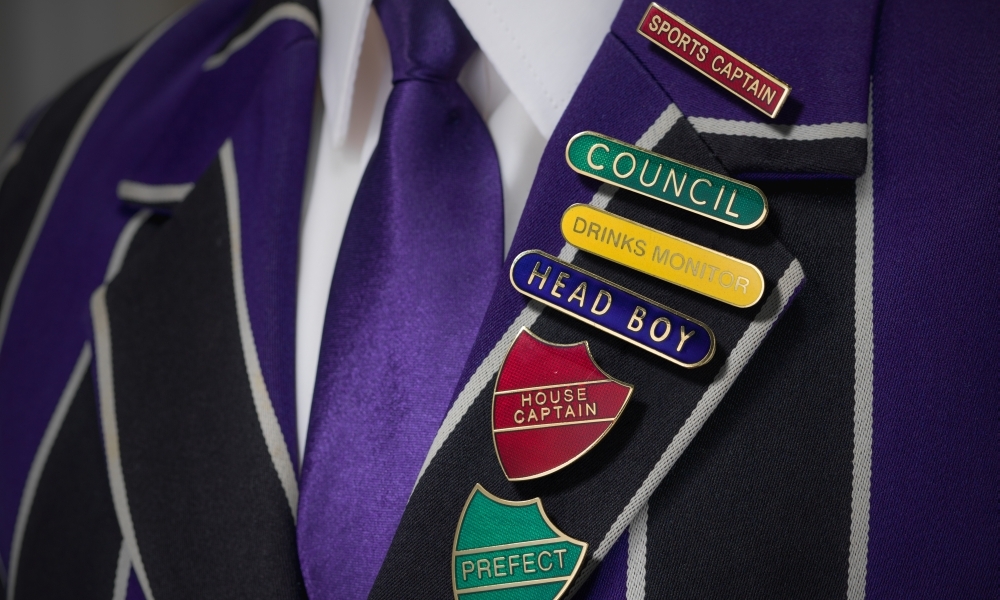Over the last four years, Aquinas College in Perth, Western Australia, has revamped its Student Leadership program, with the aim of increasing participation and strengthening student voice. In our latest reader submission, Mark Weston – Director of Character Education and Leadership at the K-12 Catholic day and boarding school for boys – shares details of how the program is structured and the impact it’s having.
When I reminisce about my school days and the experience I had with student leadership, I believe my account would be like many others’. A limited number of students were elected to a position of House/Faction Captain or as a member on the Student Council.
There was minimal to no leadership training for students or focus on the development of the skills required in leadership. It was simply a popularity contest with student leaders gaining experience through participation in school events and activities and being called upon by teachers to undertake tasks due to the title of Student Leader.
I had never taken the time to question the validity of having only one Student Council at a school – to me, it just seemed to be the way schools operated as I had grown up under the same system.
It was only four years ago that my eyes were opened to the flaws of this student leadership system. Head of Senior School at Aquinas College, John Van Dyk, came back from a conference and expressed his excitement at hearing a presentation by Professor Donna Cross from the University of Western Australia. She spoke about the Australian Student Wellbeing Framework (Education Council, 2018), and a key aspect she highlighted was the importance of student voice in 21st Century schools.
Multiple councils – many student voices
This new insight challenged us as a staff to find where we could create student voice opportunities at Aquinas College. We determined a great avenue for this would be to revamp the student leadership system by stepping away from the old school method of having one Student Council to implement a system that revolves around multiple councils with many student voices being heard.
The Student Leadership program we designed is based on our belief that all students have leadership potential and are called to become leaders by being active participants in the life and works, not only of the Aquinas community, but also broader society.
We wanted this new system to provide leadership experiences accessible to all students in the College and provide opportunities for them to develop the skills of good leadership – collaboration, creativity, critical thinking and communication. This skill set we see as vital to the formation of good people in the 21st Century.
We also wanted to provide an opportunity for student voice to be heard by teachers. To do this, 16 councils were created to cover all areas of the College – staff with a passion for a particular area were invited to oversee the council.

Our philosophy of student leadership aligned seamlessly with the Character Education program the College instigated in 2018, based on the research of the Jubilee Centre for Character and Virtues (2017) at the University of Birmingham, in the UK. We had a desire to recognise boys as College Prefects who:
- showed good character and upheld the College Values;
- demonstrated good behaviour;
- showed dedication and effort in all aspects of their school life; and,
- grew their leadership capacity through their application to a variety of challenges.
Progressing through the program
Leadership is an area where time is needed for optimal growth to occur, so we put in place a Student Leadership program that runs through Years 10-12, allowing students to mature into a leader. There are six steps students need to progress through to become recognised as a Prefect of the College.
Step 1 (Introduction & Application)
In Term 1 of Year 10, the Student Leadership program is introduced at a Year assembly with an overview of the 16 Student Councils. Afterwards, students are invited to apply online and to attend a couple of council meetings to help decide which council they want to be on for Semester 2 onwards.
Step 2 (Participation & Contribution)
Students commit to completing the Service-Learning Program, show involvement and full participation in all school activities and events, actively engage in all College faith formation activities such as Liturgies, Masses, and the College retreat program.
Step 3 (Conduct & Behaviour)
The student maintains good standing in the College, avoiding high level disciplinary action such as suspensions. They strive for excellence in everything they do and obtain positive Performance and Character Attributes on their school report.
Step 4 (Demonstrates Leadership)
The Skills of Leadership Workbook is completed by the start of Year 11. The student is actively involved in their student council and consistently takes up opportunities to demonstrate their leadership capacity by volunteering their service and time to events and activities around the College and wider community.
Step 5 (Review & Reflection)
In Term 2 of Year 11, the student undertakes a review and reflection of their leadership growth with the facilitating staff member of their council.
Step 6 (Team Leadership Challenge)
The student collaborates with others to bring to fruition an activity, event, or promotional project. The planning booklet for their Team Leadership Challenge is completed and approval is given by the Head of Senior School or Director of Character Education and Leadership.
By the end of Term 2 in Year 11, students should have completed all steps and are approved by the Director of Character Education and Leadership to be presented at the Prefect Induction Assembly, where they receive a Prefect tie and badge.
The leadership structure
As in the corporate world, which has a hierarchical leadership structure of Executive Leadership Team and Middle Managers, our councils operate under a similar system. Each has a Captain to oversee the Prefects and council members. Captains meet regularly to keep each other updated on what the councils are doing or planning.
To become a Council Captain, College Captain or Vice-Captain, each Prefect is invited to undergo the selection process. About half of the Prefects will nominate for these positions, whilst the others will be happy to continue in their role as Prefect, applying themselves to running their council projects.
The selection process for Captains involves a written application and interview with the current Captain and lead teacher of the council for which they have nominated. Students nominating for Captain and Vice-Captain of the College complete a slightly different process.
Firstly, Year 11 students and teachers are asked to vote for their preferred Captain and Vice-Captain. After the votes have been counted, the top six candidates are invited to an interview with a panel consisting of the Head of Senior School, Director of Character Education and Leadership, current College Captain, and Vice-Captain. The Head of Senior School and Director of Character Education discern the successful applicants through consideration of their written application, number of student and teacher votes, and the interview.
Impact on student leadership participation and voice
The old model of student leadership had one Student Council with 24 boys recognised as Prefects. In comparison, this year Aquinas has 83 prefects from a cohort of 188 – approximately 45 per cent of the Year 12 population.
The new program has the added benefit of upskilling students in the character traits of good leaders, as well as providing authentic opportunities to practice leadership. It has also cultivated a strong student voice that has brought to fruition many new student-led initiatives.
In 2021 there were just over 50 projects instigated and run by the student councils. These included the Culture Council organising an interhouse Battle of the Bands, the Student Wellbeing Council running promotional activities for Men’s Mental Health week, the Boarding Council running an interhouse sports competition, the Divinity Council organising liturgies for special occasions on the College calender, the Justice, Peace & Advocacy Council promoting respectful relationships with their ‘She’s Someone campaign’, the Sustainability Council starting up the Containers for Change initiative to direct Aquinas towards a greener future, the House councils running interhouse basketball and soccer competitions alongside organising their House days, and the Academic Council hosting a General Knowledge Kahoot competition.
These are only some of the many more initiatives made possible through the proactivity from students. The student leadership team also worked on other projects that addressed a problem or a demand in the school beyond the confines of a single council.
The inaugural interhouse esports competition came about after many students expressed their interest in having such an event, and the competition was also seen as an opportunity to involve those students in our community who may not be as involved in the other aspects of college life like academics, sports or the arts.
Another initiative was a Trivia Night for the Year 10 students of Aquinas and Perth College (an all girls school) to participate in. The Student Leadership Team realised the importance that an extra opportunity for Year 10 boys to socialise with girls in an environment other than the normal dance social that would foster positive conversations. Furthermore, this event raised money for the Class of 2021 Bursary Scholarship Fund to help provide education and opportunities for future students.
To see how well this new student leadership system operates, you only need to read what the College Captain of 2021 wrote in his annual report:
.... the Student Leadership Program structure and the many councils we have at our school has taught us how to make a real impact and positive change to our community for those around us. The school has been able to cultivate student voice and from that we’ve been able to achieve so much as a community.
References
Education Council. (2018). Australian Student Wellbeing Framework. Education Services Australia. https://studentwellbeinghub.edu.au/educators/resources/australian-student-wellbeing-framework/
Jubilee Centre. (2017) A Framework for Character Education in Schools. University of Birmingham, UK. https://www.jubileecentre.ac.uk/527/character-education/framework
Thinking about your own school, what opportunities are there for students to develop their leadership skills? Do you have a student council, or similar group? Is this open to all students?
What role does student voice play in the planning, implementation and development of programs and events in your school and wider community?



